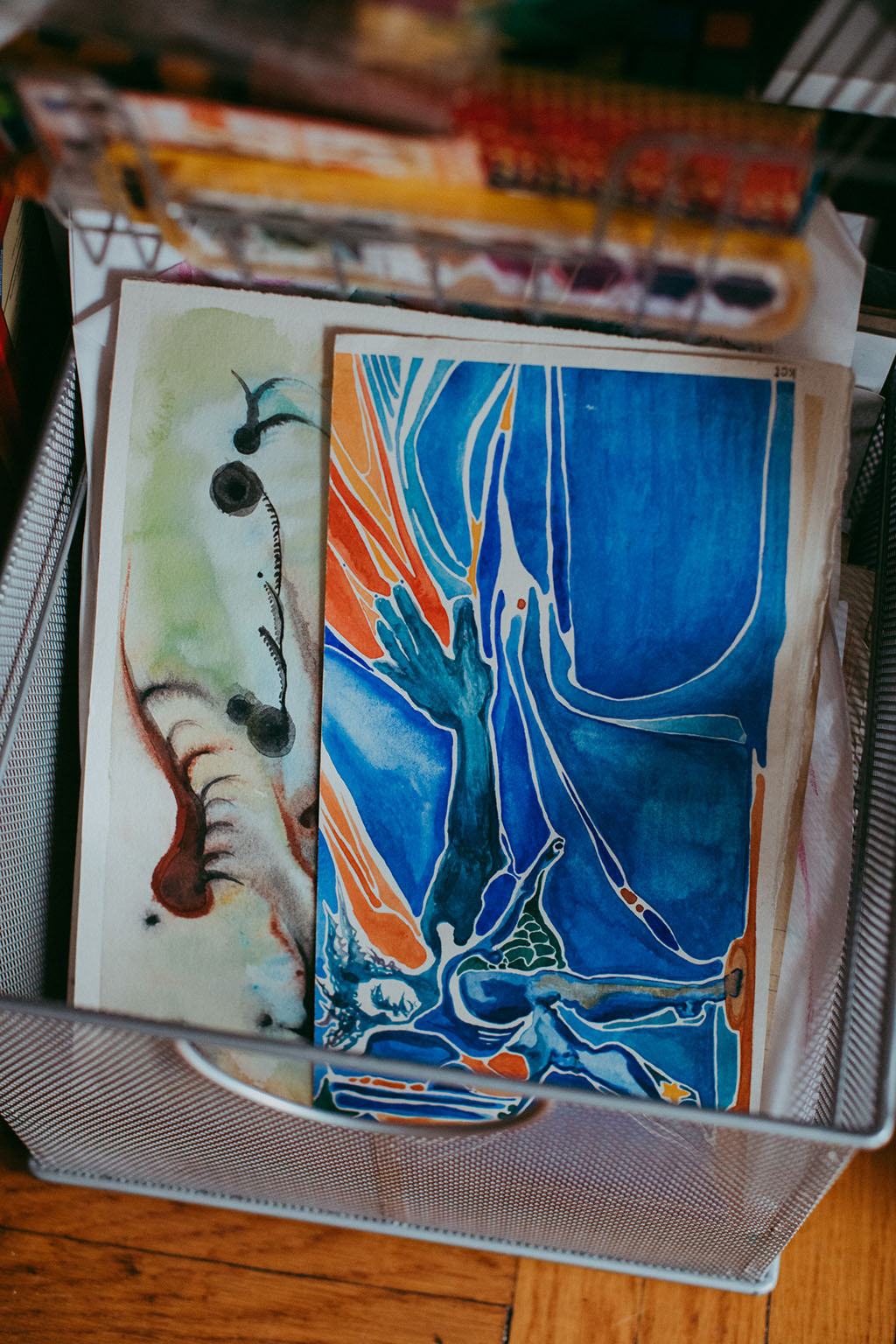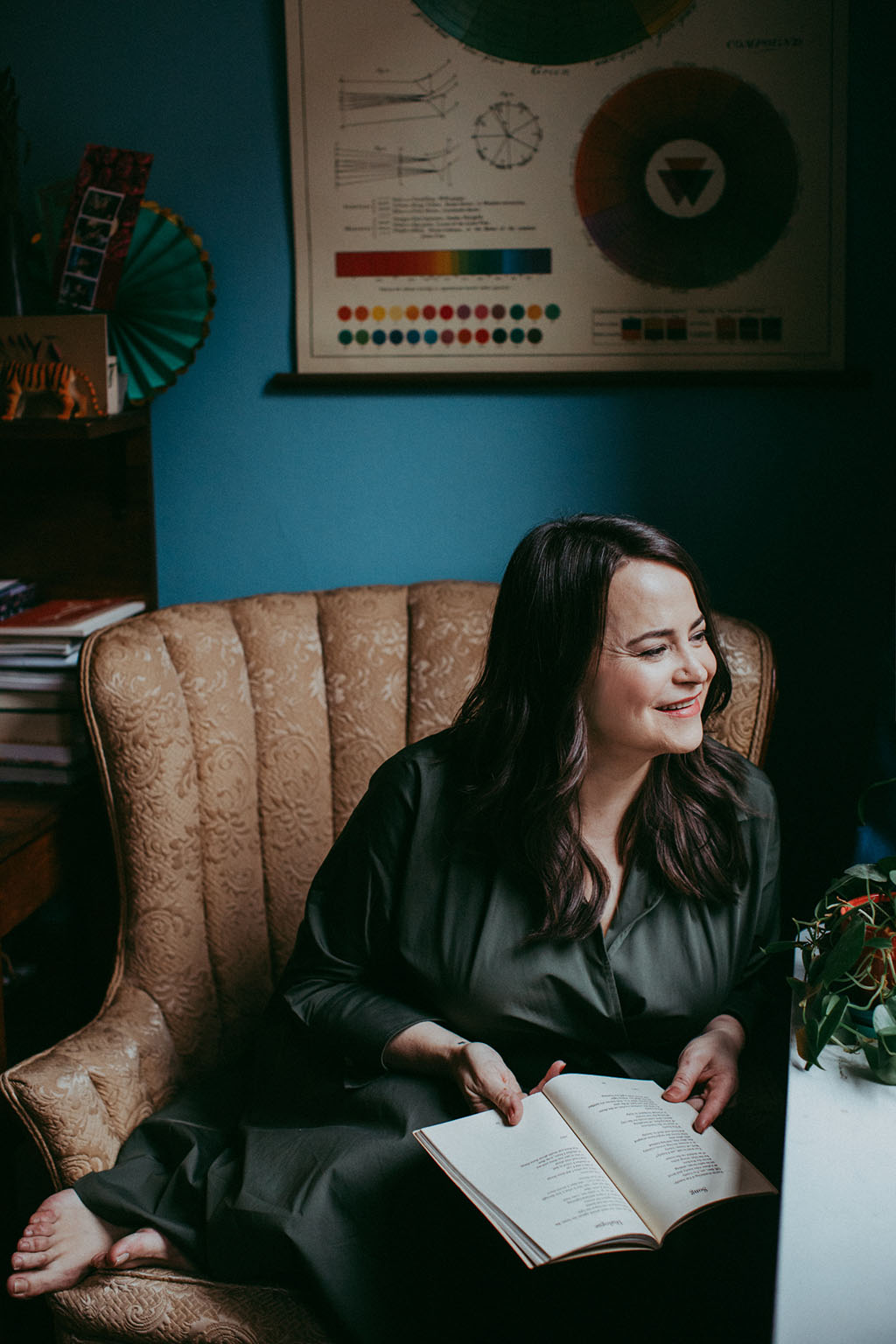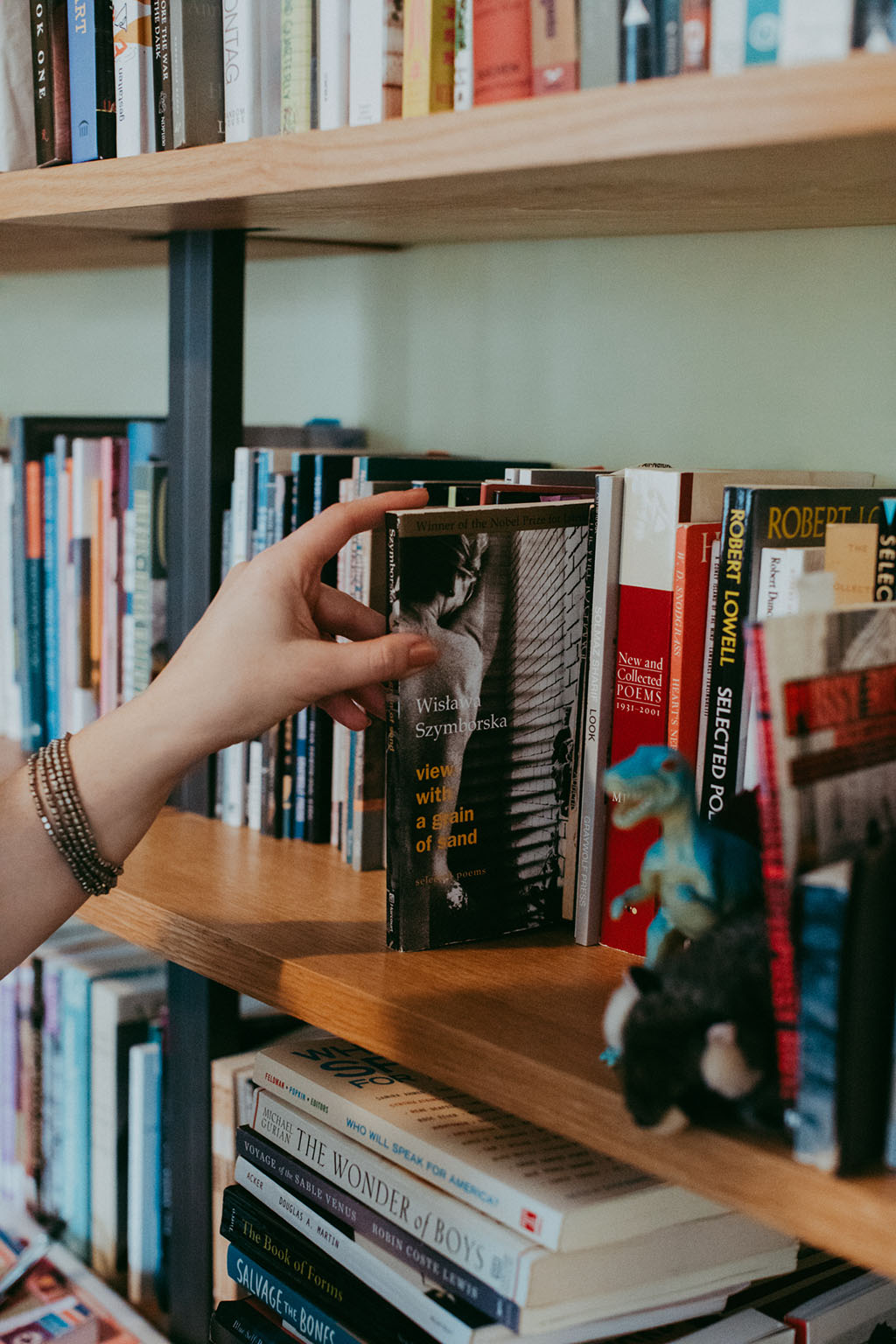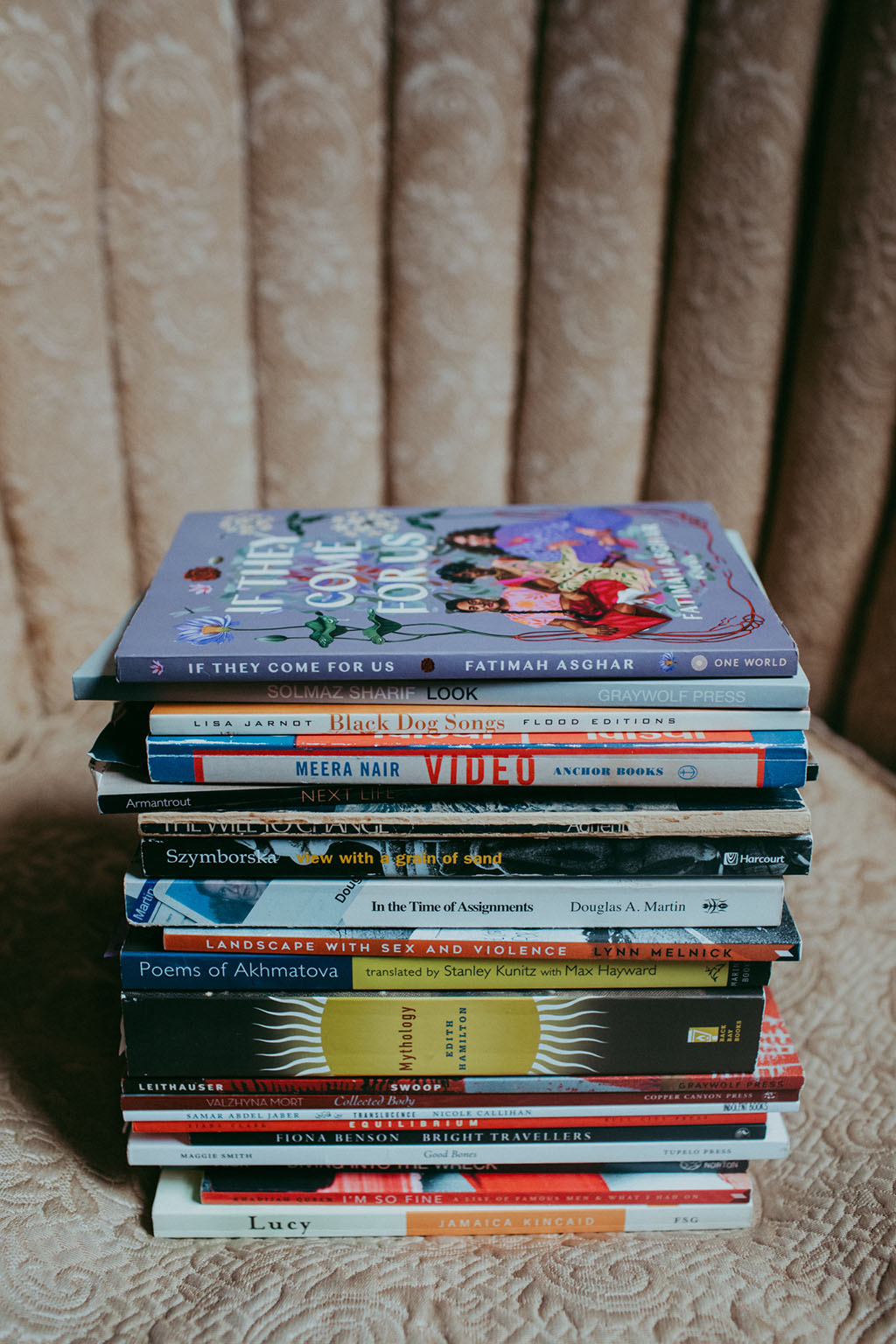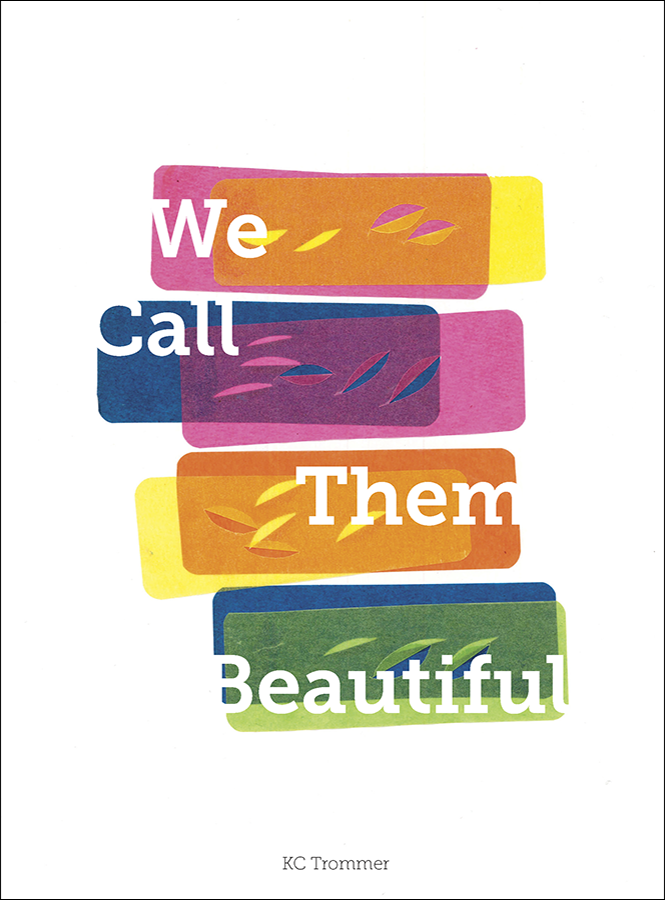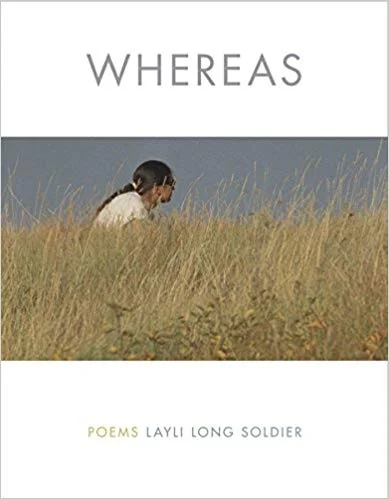
KC TROMMER
KC Trommer is the author of the debut poetry collection We Call Them Beautiful (Diode Editions, 2019) and the chapbook The Hasp Tongue (dancing girl press, 2014). She is the founder of the audio project QUEENSBOUND and is the Assistant Director of Communications at NYU Gallatin. She lives in Jackson Heights, Queens, with her son.
Photography by Sylvie Rosokoff
GAL: What what was the first book that you fell in love with that turned you into a lifelong reader?
KC TROMMER: In terms of fiction, the book that I read and reread was Island of the Blue Dolphins by Scott O'Dell.
GAL: I love that book. Why did you love it?
KT: I think I was drawn to the tragedy that the main character triumphs over and the fact that she made her life beautiful even though it was unwitnessed. [Laughs] This is probably why I'm a poet.
GAL: Which books of poetry turned you into a lifelong reader?
KT: Adrienne Rich's The Will to Change is my first favorite, most dear collection of poetry. When I looked through the questions you sent, I went to my shelves and looked at it again. I wondered Is this true? Am I telling the truth? That's the story I tell myself, but is it true? And, sure enough, there are lines in there that are burned into my brain and which are a part of my internal conversation. Things that I think about poetry hew really closely to what she’s written in that collection. I may have another answer, though.
GAL: Please tell us.
KT: The summer when I was 19, I had a very glamourous job, working at the Dress Barn in the Lake George Mall in Lake George, New York. We had a terrible soundtrack with Dylan's "Lily, Rosemary, and the Jack of Hearts" on a regular loop at hour six of my eight-hour shift. It was maddening. On my lunch shift one day, I went to the bookstore and in the bargain bin found Sharon Olds's The Gold Cell, which I really loved for the poem, "I Go Back to May 1937.” It's a very poet's poem. It's about a vision that the speaker has of when her parents meet, and knowing they shouldn't be together, but willing them to so she can live.
GAL: That's beautiful.
KT: It opens with "I see them standing at the formal gates of their colleges," and she describes "the/red tiles glinting/like bent plates of blood". Very dark. In the poem, she speaks to those earlier iterations of her parents, saying, " you are going to do things/you cannot imagine you would ever do”. Then she just, in her poetic imagination, wills them together. She says, "Do what you are going to do and I will tell about it." It's a really powerful poem, and also spoke to me just about figuring out how to reconcile the fact of who you are who your family is. I kept that book very close that whole lonely summer long.
photo by: Sylvie Rosokoff
GAL: Why is solitude important for you and for your work?
KT: I love community and feeling connected to other people. But I grew up in all of these weird family structures that meant I was alone a lot. My parents were divorced when I was four. My brother and sister are 13 and 12 years older than me, respectively. I spent most of my childhood with my mom and my sister and the summers with my dad in Maine, and a lot of time on my own. During the school year, my mom worked a lot. I had to entertain myself, and so books kept me company and I read.
GAL: Sounds similar to a childhood I know well.
KT: I had a lot of time on my own. I also found myself on the outside looking at other families, even my own. That's a writerly impulse, too, I think.
GAL: How did you survive 2018?
KT: I have an online audio project, QUEENSBOUND, that I devoted at lot of time to, particularly when the Kavanaugh hearings were happening. QUEENSBOUND was an idea I’d been kicking around because there so many talented writers in Queens but not everybody knows everybody and I wondered how can we could create an informal directory of Queens poets.
I protested Kavanaugh’s confirmation, of course, but to get through, I had to turned a lot of my attention into doing that project. I was so grateful to be making art, and to be bringing out the work of people whom I admire. It was incredibly affirming to have it be very local, and to feel connected to people in my community. I needed that because those hearings felt impossibly difficult. It was hard for me to see people being hopeful. I found myself telling people to adjust themselves to the idea that, despite the fact that it's very obvious what's happening here to those of us with eyes to see, that this is going to happen. It was really hard to see people trying to think that justice would prevail, that the truth would prevail, in the way that people who haven't had to go through or deal with the justice system hold onto until they get schooled.
The launch itself really felt like an antidote to all of the menace that's been on us. This project felt really affirming, and joyful, and celebratory: to have that reading on the train, hearing everybody, and having everybody really pay attention and think about our neighborhoods, our community, and the beauty and diversity of Queens.
It's been a breakneck kind of fall, because, also, my book got picked up, which was great. I had to think about how to tighten it so that I'd feel comfortable with it being in the world. I really just survived the year by doing activism and art so I was putting my love and attention into making art and building community, as a way to reinforce and fortify the things that matter.
GAL: How often do you read?
KT: I live a car-less life, so I read on the train to work and from work, and if I don't have lunch plans, then I read at lunch. There was a lot of chaos in my life for a number of years, and so I hadn't been reading a lot or well. I've been catching up, and also trying to figure things out. What's the contemporary poetry landscape looking like? Who's doing interesting work? Whose work is speaking to me? So I read to better listen to that conversation, and find out where there's dynamism, and where there's something new and something resonant happening. My son and I read together before bed. He wants me to read while he goes to sleep, so I sit and read while he falls asleep, and that's also a nice way to find more time.
GAL: That's really nice. Why do you feel so connected to Queens? How long have you lived there?
KT: When I first moved to New York, I lived in Brooklyn, in Fort Greene, then Williamsburg. I moved to Astoria by chance, chasing cheap rents. I had a roommate who was a Brazilian bat scientist at the Museum of Natural History and we moved to Queens because it was mutually inconvenient, and therefore fair. [Laughs] I was working in publishing for Simon & Schuster. It was a little inconvenient for me because I'd been used to living in Brooklyn, but it was a little less inconvenient than moving deeper into Brooklyn would've been for her. And then I just stayed.
GAL: It’s interesting how you’ve spent a fair amount of time with scientists during different parts and areas of your life. But for some reason science and poetry make sense together in my mind.
KT: Yes, totally. I’m working on a proposal for a project on Acadia National Park in Maine, about the intersections of art and science. I feel like scientists and artists, poets especially, look at the world with wonder, but use different vocabularies.
GAL: For how long did you live in Astoria?
KT: I lived there until I went to grad school in Michigan. Then I came back, and my now ex-husband and I moved to Sunnyside. When we split, we had to stay close geographically for the sake of our son, so I put a neighborhood in between us and moved to Jackson Heights. More than any other neighborhood I’ve lived in, Jackson Heights feels like a community. This is also probably because I have a kid and that fact connects you to your neighborhood in really concrete ways. It's a small town in its way. When you walk down the street, you see people you know on every block. In part this is because there are a lot of co-ops, so people own their apartments and are quite literally invested in being here. There are also a decent amount of rent-stabilized apartments, which hopefully will stay in place when the rent laws are in this coming June. Thanks to a conversation at my son’s bus stop, I found a really amazing apartment for us and I don't ever want to leave it. It's so sweet and it's big, and we have a shared backyard garden.
“I think there’s a real prioritizing, celebrating, and embracing
of voices from everywhere [in poetry now]. ”
GAL: How has your poetry evolved since you started writing poetry?
KT: If there's been any evolution, it's that the poems I had to get out of me are the substance of my forthcoming collection, We Call Them Beautiful. They're going to have a home, and they're going to have an existence outside of me, my computer, my brain, which is nice, because it makes way for me to write about new things. For the past few years, I think the reason I love a particular new piece I’ve written is because it's generally dealing with similar concerns of past pieces. In some capacity, at least. I think I'm writing something new, but even then it turns out I'm just writing a new version. I'm writing at my same obsessions from a different angle. Which is, for good or for ill, what we all do.
GAL: I think that's absolutely true. I think that's creation in a nutshell, right there. We grapple with the same things over and over and over again through different lenses. I don't think there's anything wrong with that. How do you see the landscape of poetry now? You said that you've finally had time to really investigate or enjoy what's going on. What do you see happening that's exciting or that thrills you, or pieces you in a place that feels powerful?
KT: I think there's a real prioritizing, celebrating, and embracing of voices from everywhere. In American poetry, there's definitely a heavy youth focus, which is its own good if sometimes thorny thing. But it feels like those whose perspectives aren’t mainstream are now at the core of the conversation and of the making of contemporary poetry, which I really love. I just read Whereas by Layli Long Soldier, which is a great example of the shattering of old structures in the language itself and in the dismantling of the dominant culture. Her work accretes meaning and resonances in really interesting ways over the course of the book. I think there is, in the face of all of this, in this aggressive white, male patriarchal world in which we're having to face down, this incredible embracing and celebration and appreciation for the voices that are not that. It feels like that's happening, though it could be my attention has turned that way, too.
GAL: No, I think that's true. That feels true to me, too.
KT: Yeah, and that’s exciting and interesting.
photo by: Sylvie Rosokoff
GAL: What is the power of story, KC? Can you describe some ways in which fictional narratives have impacted you in your life?
KT: I think often about the stories that we tell ourselves in order to survive, the story that I have to tell myself about how my life has gone in order to be okay with where my life is. I think about that a lot. My family was split from early on, and so I had two sets of people who told me who I was. Part of why I became a writer was not only because half of my family is all artists, and we needed someone who was a good communicator, but also because I knew both sides of my family were getting something wrong about the stories they were telling, about me, anyhow, and also about where we overlapped. I wanted to write into a third way, to write what I understood to be the truth.
I've always looked to other people's stories to see how people are in narratives, in poems, or in short story collections, or books. In Chimamanda Ngozi Adichie’s Americanah, one thing that really struck was that the main character, Ifemelu, would make what seemed to me like mistakes, or errors of judgment, but she didn't spend the book upbraiding herself, she just carried on with her life. Which seemed to me so radical. Radical self-acceptance. I could not understand it, and admired it in the character and knew there was a lesson there. Just somebody else's story and how they comport themselves in their lives, even in a fictional narrative, can help you understand the ways in which you could be kinder to yourself and other people. Look at stories for alternate endings, alternate ways of being, ways that don't occur to you.
GAL: Can you read on a Kindle? Can you read on a device without any issues?
KT: I'm on the computer all day and I overuse my phone to communicate. I hate reading on devices; I hate reading things that I love on them. I need the paper. Not only for reading my own work, but for other people's work, I need the thingy-ness of the thing. Especially for poems. I like to see them laid out on the page, and I like to have the page be a page.
A friend of mine who is Renaissance scholar said the reason that pages are the way they are is because the oblong side of the calf corresponds to the rectangular shape of our pages, which blew my mind. The physical history of the earliest books is in the DNA of all books. Behind the shape of a book is the body a dead calf from centuries ago.
GAL: You’re a visual artist as well, right? Do you still paint or draw?
KT: Yes, but it’s hard to make the time for that along with working full-time, solo parenting, and writing. I had some art on my website mostly to make me remember that I make art. For We Call Them Beautiful, the publisher, Diode Editions, looked at my site and they said they liked my collages and asked me for a collage of mine for the cover. So, over the course of a long weekend, I made a series of collages and came up with what’s become the cover.
“My love for making art is very pure in the way that my love for making poetry
isn’t because it gets caught up with being my major creative focus.”
GAL: It's beautiful.
KT: Thank you. I made bunch of different collages before I finally came on that one, and I was like, "There." My son approved of that one more than any other, so that was good, too.I grew up with artists on my mom’s side and my brother and sister are much older than me and more accomplished. Long ago, I decided I would just quietly make art, but not capital-A Art. My love for making art is very pure in the way that my love for making poetry isn’t because it gets caught up with being my major creative focus. Whereas with art, I feel like I can be more playful and have more fun, and be in a different part of my brain. It's weirdly more satisfying.
GAL: We have a friend that has a sanity shelf, which is dedicated to books that she returns to again and again to reread for pleasure, knowledge, and solace. What books would be on your sanity shelf?
KT: That's a good question, because I get infatuated with books. I love Frank O'Hara, of course, and Lunch Poems. I love, as I said, Rich's The Will to Change, and Lucy by Jamaica Kincaid. It’s an incredible, very economically told story of a young woman who comes from Antigua and is a nanny in New York. It's a coming to New York story. The narrator is a fierce and wonderful presence. She unapologetically feels what she feels, is who she is, and is a thoughtful observer of the world around her. Let's see. I love David Wojahn's collection Glassworks. I love Heather McHugh. She has a book called Upgraded to Serious that's incredible. I kind of have a long list. Szymborska. When we moved into this apartment last year, I was organizing my bookshelves. I put all the books that I love next to each other, shoulder to shoulder. This year, I started re-reading old favorites.
GAL: How do you generally choose the books that you read?
KT: For poetry I have a long, never-ending list of "to reads," but what I've been doing to save myself money is requesting every title that gets off mentioned in the Twitter-scape at the library, and then deciding if I love it, if I want to buy it. I've been putting everybody on probation. This is because I bought a collection by a poet, whose name I won't mention because everybody loves this poet and I brought it home, and it felt like a dead thing. The poems just weren’t alive. I was like now I have to go back to the bookstore, and I have to somehow tell them why I want to return it. Maybe lie. I couldn’t say, “This is a dead thing.” Most recommendations I get are from friends and I pay attention to oft-mentioned people. I spend some time in bookstores reading back flaps, and then a little bit of bibliomancy, where you just crack open the collection and see if the poems sing. If they don't, I just put them back.
GAL: What are your favorite genres besides poetry?
KT: I'm pretty heavy on the fiction. I'm reading a biography of O'Hara along with his collected to read the poems in conversation with his life. There’s an incredible biographer, Brenda Wineapple, who has a whole series of really stunning biographies, one of Leo and Gertrude Stein called Sister Brother, and one of Genêt. My favorite of hers is one about Emily Dickinson. It's called White Heat, which is a double biography of her and the abolitionist Thomas Wentworth Higginson. If I'm reading anything other than fiction, it's biographies. I should read more history, and some social justice texts. I'm reading The New Jim Crow because it seems so necessary to understand all that we, especially white people, have been taught to look away from. Have been able to.
photo by: Sylvie Rosokoff
GAL: Would you name three books that you'd recommend for every GAL to read, and the reasons for your choices?
KT: Hmm. I can think of a few that were given to me and which I then bought for other people. My friend Danielle pressed Alexander Chee's How to Write an Autobiographical Novel into my hand and I’m grateful to her for that. She knew that I’ve been working on essays, and she was like, "If you're writing essays, you need to read this." Chee's a Mainer who lives in New York, and he also writes such lucid, beautiful, and true pieces of nonfiction. I love so many of the essays in there. Probably my favorite essay in there is about him growing a rose garden in a hardscrabble backyard in Brooklyn.
I really love Tunsiya/Amrikiya by Leila Chatti and Bull City Press, another book given to me by a friend, the wonderful poet Faisal Mohyuddin.
Fiona Benson's first collection, Bright Travellers, is stunning—just brilliant. Kelly Sullivan, a poet and friend, took me to hear her read. My friend Meera Nair has a collection of short stories called Video and she's an incredible lyric prose stylist. She's writing about India and also writing about Indians in the United States and the stories are wildly divergent. She’s really a virtuoso.
Featured Books
More Like This







